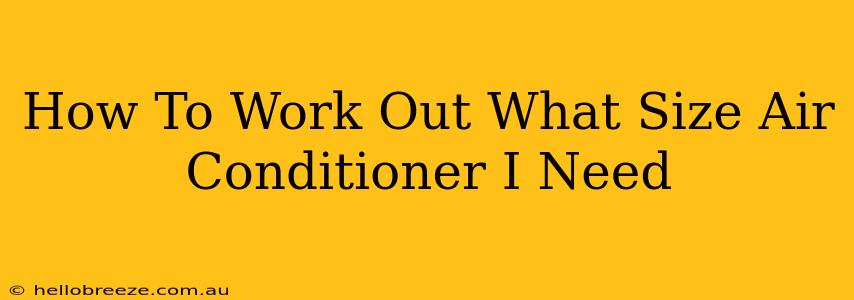Choosing the right air conditioner can be tricky. An undersized unit will struggle to cool your space effectively, leading to higher energy bills and persistent discomfort. Conversely, an oversized unit will cycle on and off frequently, potentially costing you more money and failing to dehumidify properly. This guide will help you determine the correct size air conditioner for your needs.
Understanding BTU Ratings
The key to selecting the right air conditioner is understanding British Thermal Units (BTUs). BTUs measure the cooling power of an air conditioner. A higher BTU rating indicates a more powerful unit capable of cooling a larger space. However, simply choosing the highest BTU rating isn't the best approach; it's about finding the right BTU rating for your space.
Factors Affecting BTU Requirements
Several factors influence the BTU requirements for your space:
-
Room Size: This is the most significant factor. Larger rooms naturally require more cooling power. Measure the length and width of the room to calculate its square footage.
-
Ceiling Height: Higher ceilings mean more air to cool, increasing the required BTU output.
-
Number of Windows and Their Size: Larger windows and more windows allow more heat to enter the room. South-facing windows, in particular, receive significantly more solar heat.
-
Insulation: Well-insulated rooms retain coolness better, reducing the required BTU output. Poor insulation necessitates a higher BTU unit.
-
Climate: The average temperature and humidity in your area directly impact cooling needs. Hotter, more humid climates require more powerful air conditioners.
-
Number of Occupants and Appliances: People and appliances generate heat, increasing the cooling demand.
Calculating Your BTU Needs
There are several online BTU calculators available. These calculators typically ask for the room dimensions, ceiling height, number of windows, and other relevant factors. Use one of these tools to get a preliminary estimate. Keep in mind, however, that these calculators provide estimates, and professional consultation is always recommended for optimal results.
Professional Assessment: The Smart Choice
While online calculators offer a starting point, contacting a qualified HVAC professional is highly recommended. They can conduct a thorough assessment of your home, taking into account all relevant factors for a precise BTU calculation. A professional can also offer guidance on the best type of air conditioner for your needs and handle the installation process correctly.
Beyond BTU: Other Important Considerations
While BTU is crucial, other factors influence your choice:
-
Energy Efficiency: Look for units with high Energy Efficiency Ratios (EER) or Seasonal Energy Efficiency Ratios (SEER). Higher ratings indicate lower energy consumption.
-
Type of Air Conditioner: Consider window units, portable units, or split systems, depending on your space and preferences. Each has pros and cons regarding installation, convenience, and cooling capabilities.
-
Noise Level: Some units are quieter than others. Consider the noise level, especially if the unit will be located in a bedroom or other quiet area.
-
Features: Explore additional features like programmable thermostats, multiple fan speeds, and filters for enhanced comfort and convenience.
Conclusion: Making the Right Choice
Choosing the right air conditioner size is crucial for comfort, efficiency, and cost-effectiveness. While online calculators provide a helpful starting point, a professional assessment ensures you select a unit precisely suited to your cooling needs. Don't hesitate to consult with an HVAC professional to make an informed decision that will keep you cool and comfortable for years to come.

